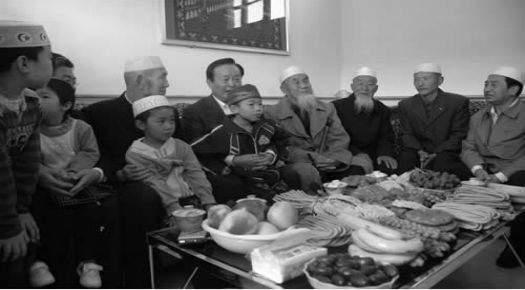
Muslim students and civil servants in Xinjiang region of China, where Beijing is enforcing a security crackdown after a recent religious unrest, have been instructed not to take part in the traditional abstinence during the holy month of Ramadan that started earlier this month. On July 2nd, notices were posted on websites of schools and government offices, informing Muslim students and employees of the ban. According to the notice, the ban was aimed at protecting concerned individuals and ensuring schools and government offices do not promote any particular religion.
“No teacher can participate in religious activities, instill religious thoughts in students or coerce students into religious activities,” said a statement on the website of the No. 3 Grade School in Ruoqiang County in Xinjiang.
Fasting and abstinence during Ramadan has been banned in China earlier as well but the situation seems even more sensitive now since Xinjiang has been under tight security after Muslim extremists allegedly carried out attacks in the region earlier this year. Sectarian violence seems to have increased in Xinjiang region recently with the atheist ruling party blaming violent extremists who want independence and members of the Uighur ethnic minority saying they face religious discrimination at the hands of the ethnic Han Chinese majority.
According to Dilxat Raxit, spokesperson for World Uyghur Congress, authorities in Xinjiang celebrated the Communist Party’s founding on July 1st by serving food to everyone to ensure Muslims in the area are not fasting.
“This will lead to more conflicts if China uses coercive measures to rule and challenge Uighur beliefs,” said Dilxat Raxit.
The ruling party says religion and education must be kept separate to ensure students are not indoctrinated by any faith group but minorities complain that the rule is rarely applied to children of Han Chinese who, if religious, are mostly Daoists (Taoists), Buddhists or Christians.
“Students shall not participate in religious activities; they shall not study scripts or read poems at script and choir classes; they shall not wear any religious emblems; and no parent or others can force students to have religious beliefs or partake in religious activities,” said the statement on the website of the grade school in Ruoqiang County.
A news portal controlled by the government of Yili published an article last week highlighting the health problems that stem from fasting. In Bole, teachers from Wutubulage Middle School were asked to guard the entrance of local mosques to ensure Muslim students do not enter their buildings of worship. The forestry bureau in Zhaosu County organized an event a day before Ramadan commenced where party cadres were made to sign a pledge saying they will ensure their families resist fasting and abstaining during Ramadan. Similarly, government offices in Hotan and Turpan made their employees sign letters to forbid them from fasting or abstaining through this holy month.
Controls on worship have been common in Xinjiang, where religious faith is an important aspect of the local culture. However, after a number of attacks earlier in the year, the Chinese government responded with a sudden crackdown that led to the arrests of more than 380 people in less than 30 days as well as public rallies to announce their sentences.
